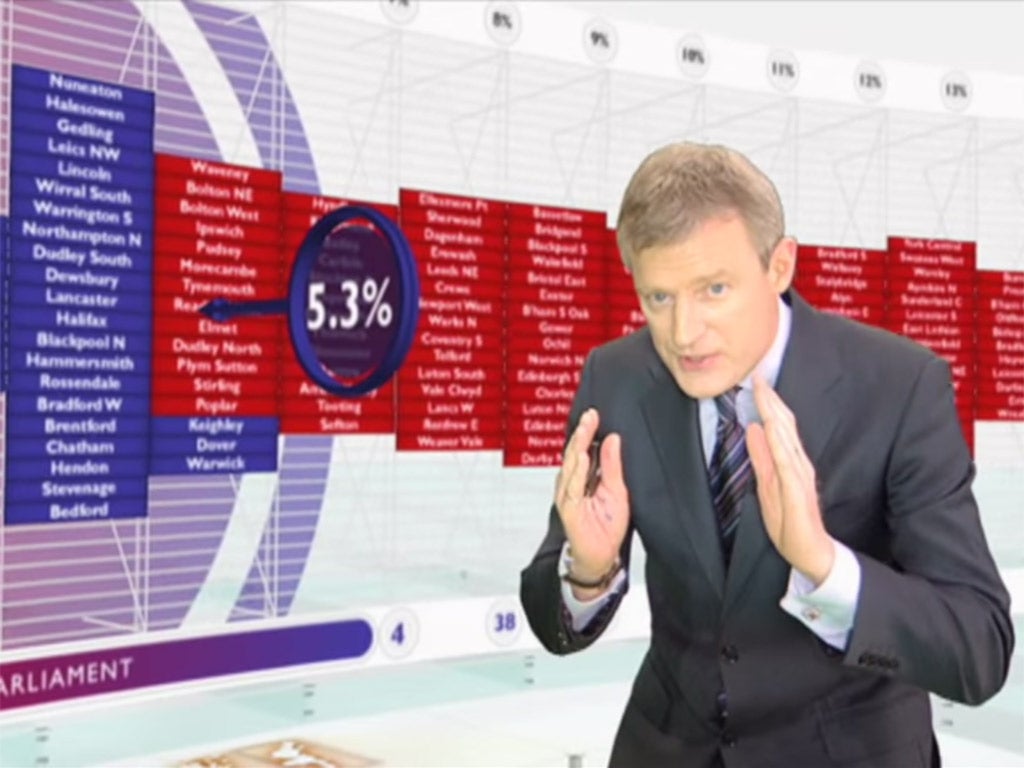General Election 2015 explained: Jargon
Continuing our daily miscellany celebrating the facts, figures and folklore of British general elections

Psephology
Psephology is a branch of political science devoted to the study of elections. The word is derived from the Greek word for “pebble”. The Ancient Greeks used to vote by putting pebbles into jars.
Like many social sciences, psephology has spawned much forbidding terminology. This selection may come in useful for election night arguments.
Dealigment
The process whereby voters who were once aligned on the basis of tribal commonalities such as class, religion or race have become less predictable in recent years. In 1964, for example, 64 per cent of manual workers voted Labour and 62 per cent of non-manual workers voted Conservative. By 2005, these percentages had fallen to 49 per cent and 38 per cent respectively.
Democratic deficit
The gap between our democratic ideals and the realities of our democratic process. For example: no government since 1935 has had the support of a majority of voters; in 1929, 1951 and February 1974, the party with the biggest share of the popular vote lost the election; in 2005, Labour won power with the support of just 21.6 per cent of the possible electorate; in 2010, the Conservatives won one seat for every 34,989 votes they received, Labour won one per 33,350 votes, and the Liberal Democrats won one per 119,788 votes. More simply: 53 per cent of votes cast in 2010 – 14.7 million votes – were for candidates who lost and, as a result, did not affect the composition of Parliament.
Disproportionality
The discrepancy between the percentage of seats won and the percentage of votes received.
Duverger’s law
The principle, laid down by French sociologist Maurice Duverger, that plurality voting (see below) tends to encourage two-party dominance.
The current contest may well consign this principle to the dustbin of psephology – but if it does belatedly turn into a two-horse race, remember to mention Duverger.
Plurality
Plurality voting is a term sometimes used to describe the version of the “first-past-the-post” system used in UK general elections, in which each constituency chooses between a number of candidates, the one with the most votes wins, and the others achieve nothing.
A party is said to have won “a plurality” of votes, rather than a majority, if it wins more votes than any other party – even if this is not more than all the others put together.
Purdah
The period between the dissolution of Parliament and a general election, when civil servants are subject to extra rigorous rules about avoiding party political activity.
Sectoral Cleavage
Vogueish phrase encapsulating the idea that party allegiance is mainly determined not by class or employment (see “Dealignment”) but by people’s relationship with the public sector. Those who work in it, or make heavy use of its services, will tend to form one political tribe; those whose lives are defined mainly by the private sector will tend to form another.
Swing
Unvogueish phrase, once used to denote the difference between a party’s percentage vote in one election and its percentage vote in the previous election but increasingly irrelevant in the age of multi-party politics.
The 2010 general election saw a 4.9 per cent swing from Labour to the Conservatives. This kind of swing, from one party to another, is known as conventional swing, or Butler swing. A more sophisticated measure, Steed swing, excludes from the calculation the votes of all parties except the two being compared.
Swithering
A form of volatility (see below), also known as “churning”, this refers to voters’ propensity to switch party allegiance during an election campaign.
The percentage of voters swithering in the course of recent elections has been estimated at between 30 per cent (in 1997 and 2005) and 37 per cent (1992).
Tactical Voting
Phenomenon whereby, rather than “waste” their votes on candidates with no chance of winning, voters vote for candidates they do not really support in the hope of influencing the wider outcome.
Tactical Unwind
The phenomenon whereby voters who have voted tactically in past elections revert to voting for their preferred party. Could happen on 7 May if voters conclude that there are too many unknowns and permutations for tactical voting to be viable.
Valence
Some political issues – austerity, for example – are position issues, on which different parties take different positions. Valence issues are issues on which most parties agree – eg, “saving” the NHS – and voters have to decide which party is most to be trusted on that issue. Valence issues are increasingly important in modern elections.
Volatility
The propensity of voters to switch their political allegiances. Has increased markedly in the past 45 years.
Vote-swapping
A form of tactical voting, facilitated by the internet but based on trust, whereby a supporter of one party “pairs” with a supporter of another party in another constituency and each votes for the other’s party.
Tomorrow: No.11 Law
The Independent has got together with May2015.com to produce a poll of polls that produces the most up-to-date data in as close to real time as is possible.
Click the buttons below to explore how the main parties' fortunes have changed:
All data, polls and graphics are courtesy of May2015.com. Click through for daily analysis, in-depth features and all the data you need. (All historical data used is provided by UK Polling Report)
Join our commenting forum
Join thought-provoking conversations, follow other Independent readers and see their replies
Comments
Bookmark popover
Removed from bookmarks